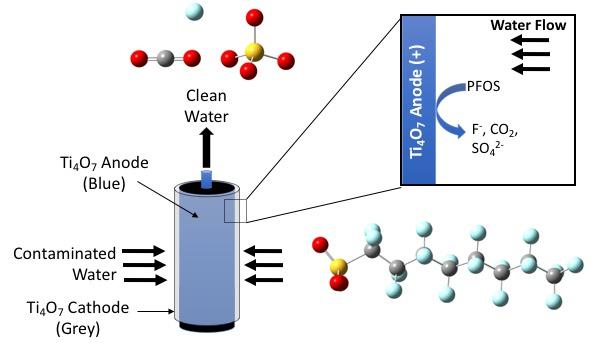$1 million grant advances research from College of Engineering

Credit: Brian Chaplin and Shafigh Mehraeen/UIC
Researchers at the University of Illinois Chicago who have developed a reactive electrochemical membrane that can adsorb toxins and degrade them are now testing their technology in the field.
They hope their technology will be an effective tool for removing perfluoroalkyl substances from groundwater.
Also known as PFAS, perfluoroalkyl substances are man-made chemicals found in many common materials, like certain food packaging, non-stick coatings, and stain- and water-resistant materials. But while PFAS are common in industrial societies like the U.S., they can have harmful health effects. These effects are compounded when large concentrations of the chemicals end up in groundwater and drinking water, such as in areas near landfills or certain manufacturing or testing facilities.
Evidence shows that the compounds can lead to high cholesterol and cancer, and have effects on the reproductive and immune system and thyroid.
These compounds also are used in aqueous film-forming foams, which are used and sometimes necessary to suppress fires. The U.S. Department of Defense has used fire-fighting foams and the department’s Strategic Environmental Research and Development Program, or SERDP, has awarded UIC $1 million to advance the technology and remove PFAS from groundwater near testing sites throughout the country.
“There are very few methods of treating water to destroy contaminants like PFAS,” said Brian Chaplin, UIC associate professor of chemical engineering at the College of Engineering. “One of the most effective methods to date is to use a process called REM filtration.”
REM filtration, or reactive electrochemical membrane filtration, treats water by passing it through an electrically charged membrane to promote electrochemical reactions.
“This electrochemical reaction is what our technology seeks to optimize and tailor, and we are applying the technology for PFAS compounds,” said Shafigh Mehraeen, assistant professor of chemical engineering. “Most available systems adsorb or filter the chemicals, but have no way to eliminate — they are generally considered ‘forever chemicals’ because they just move from one material to the next and never substantially degrade. Our technology advances methods for removing and, notably, degrading the compounds.”
To adsorb and degrade the compounds from water, Mehraeen and Chaplin have used novel materials — a ceramic membrane with a large surface area — in a new REM treatment process. They also have developed computer simulations to understand the adsorption and degradation mechanisms of the compounds.
The technology converts traditional filtration membranes into a reactive surface. The small pores, or holes, in the membrane will trap PFAS and the application of electricity to the membrane will cause reactions that will break PFAS molecules apart.
With the new funding, the researchers will apply the technology in the field. They hope their technology will be more effective at eliminating PFAS and reducing risk to nearby communities compared with current methods.
“If we are successful, this technology could be leveraged in numerous ways to keep communities and the environment free from harmful levels of PFAS,” Mehraeen said.
“Compounds like PFAS need to be managed at a systems level to reduce their impact on public health, and this technology has the potential to enhance the government’s and industry’s ability to do so effectively,” Chaplin said.
###
Media Contact
Jackie Carey
[email protected]
Original Source
https:/




